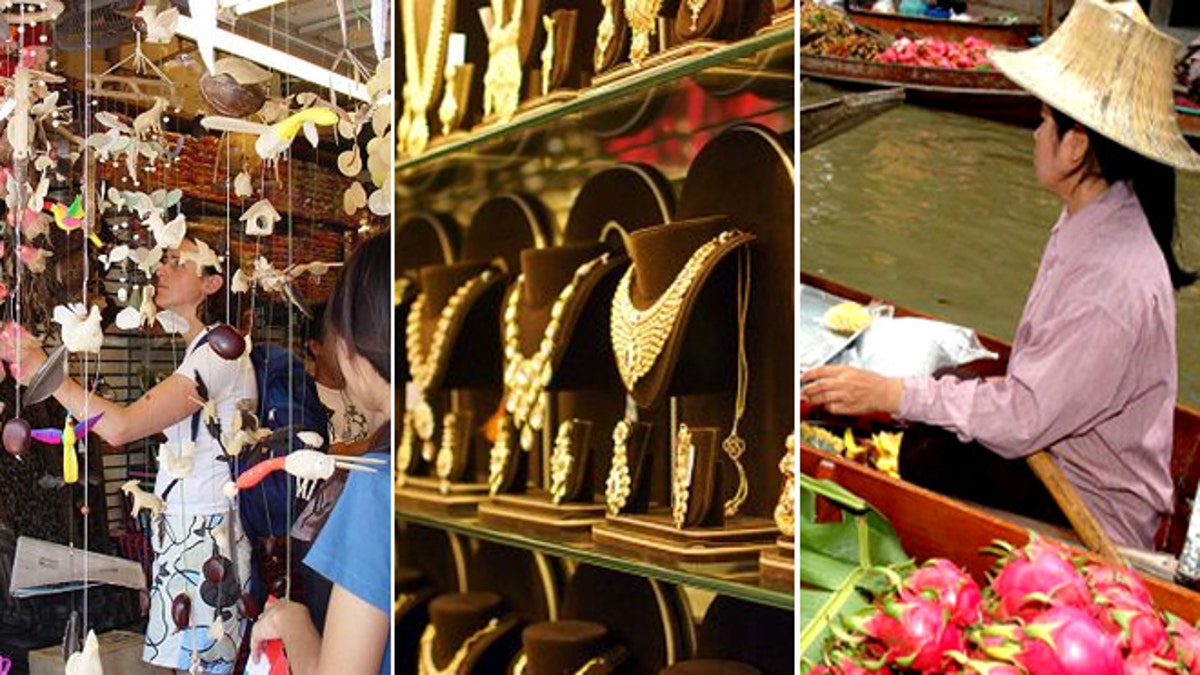
With these tips on how to haggle, you'll never get taken again when shopping the markets overseas. (AP)
Shopping in Asia can be overwhelming and intimidating for first-time travelers there. In places like night markets and street markets, bargaining is considered par for the course. As satisfying as it is to haggle for a good deal on a strand of black pearls for your girlfriend, bargaining can be exhausting and even awkward if you've never done it before. Handled with a bit of panache, bargaining with street merchants could end up being a highlight of your trip, and it's a way to gain access and insight into the local people wherever you happen to find yourself.
Over the years, our traveling experiences have enabled us to identify some useful tips to help you to get the best bang for your buck.
Learn to speak a bit of the local language
Whether it’s “nihao” or “sawadikap,” speaking just a little bit of the local language will endear you to even the sternest shopkeeper, which is your first easy step to getting a great bargain. A traveler without a phrasebook is a traveler who isn't making enough of an effort.
You can also teach them a bit of your country’s culture and native language. After all, if you are shopping at a tourist spot, chances are, the shopkeepers will also meet other tourists from your country too. Most merchants would definitely love to find out more about your background and culture.
Make small talk
You’ll be amazed how much easier it is to haggle for a ridiculously lower price with just a bit of small talk. This works especially well if you shop during nonpeak hours (such as weekday nights), since the shopkeeper won’t be dealing with tons of customers at once. Ask questions about them -- which part of the country do they come from or how has their business been going, that kind of thing. Everyone loves a chance to talk about themselves, no matter the country or the native language.
You can also tell them a bit about yourself, and where you have traveled inside their country. If possible, try to take the conversation a step further by suggesting how they can improve their sales. Compliment their goods, ask about where things come from and who made them; again, the more someone gets to talk about their enterprise, the more they’re likely to give you a deal.
More from AskMen.com
10 New Hotels You Don't Want to Miss
Make smart guesses
This skill will become better with experience. If you’re out shopping in cities like Bangkok or Shanghai, the products there are generally cheaper than in the rest of the world since shopkeepers directly import them from nearby factories. In China, the cost of a handbag made out of common leather can cost as little as $15, while the cost price of a cotton T-shirt in Thailand would be around $8.
If you are totally clueless, then start chatting up the locals shopping around the area and find out how much they are paying. Alternatively, ask the hotel concierges or take your time to shop around similar stores in the area. After all, most shopping areas in the developing world have stores that carry the same product grouped together, so play this to your advantage by finding out the average price first.
In addition, while it is important to keep in mind that most shopkeepers tend to mark up their price a lot, you should also maintain a balance when negotiating for a reasonable price.
Point out flaws
Most shopkeepers tend to oversell their products by harping on the excellence of the merchandise. Ignore that -- no product is completely perfect. Whether it’s a loose thread sticking out or mediocre stitching, there are bound to be blemishes on the product if you’re shopping at a place where bargaining is acceptable.
Walk away
Sometimes, shopkeepers can be overly stubborn on their asking price. If they are unwilling to go any lower, your last resort is to simply walk away. More often than not, they‘ll call you back, especially if you have used the tips above. After all, stores in night and street markets are very competitive for sales.
Be a smart shopper
Now that you’re equipped with the tips, make sure you leave the store as a satisfied customer. Always remember to check on your merchandise before you leave the store; sore shopkeepers may swap your item for another one of lower quality.








































